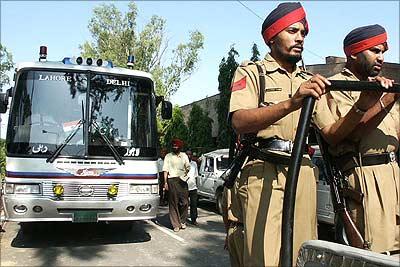 If Robert Einhorn was pessimistic about the fate of the nonproliferation regime following the Pokhran II and Pakistani nuclear tests of May 1998, security expert Devin Hagerty felt that fears about a nuclear threat to the Indian subcontinent's security and world peace could not be more misplaced.
If Robert Einhorn was pessimistic about the fate of the nonproliferation regime following the Pokhran II and Pakistani nuclear tests of May 1998, security expert Devin Hagerty felt that fears about a nuclear threat to the Indian subcontinent's security and world peace could not be more misplaced.
He said Pakistan was the ultimate winner because its nuclear tests stopped India from punishing it for its indiscretions, including during the Kargil war of 1999. Although New Delhi had overwhelming conventional weapons superiority, it feared that Pakistan would turn the conflict into a nuclear confrontation, he said.
Hagerty is an associate professor of political science at the University of Maryland and editor of Asian Security, a journal that takes a global, interdisciplinary look at South Asian security issues. He has published several volumes on proliferation in South Asia, including The Consequences of Nuclear Proliferation: Lessons from South Asia and Fearful Symmetry: Indo-Pakistani Crises in the Shadow of Nuclear Weapons.
Hagerty said the tests were hardly "the disaster that many people predicted they would be," although he acknowledged that "they were clearly a blow to the nonproliferation regime."
He argued that the tests may have prevented an all-out war between India and Pakistan following the Kargil crisis and then again in 2001, after the attack on the Indian Parliament, allegedly by Pakistan-sponsored militants.
Hagerty said that long- and short-term factors drove the Kargil crisis. He said while nuclear weapons had often been depicted in the most-cited nonproliferation literature as being an important cause for the crisis, he felt the causes lay elsewhere.
But he acknowledged that Pakistan's nuclear weapons prowess after the tests gave it new credibility and "gave Pakistani planners an additional measure of confidence as they were preparing for the ill-dated Kargil operation of late 1998 and early 1999."
"In other words," he continued, "it gave them the confidence that Indian reprisals would be deterred by Pakistan's nuclear weapons capabilities."
Hagerty felt that Pakistan's nuclear weapons stopped India from crossing the Line of Control in Kashmir and striking against Pakistani training camps, sanctuaries, etc, and punishing Pakistan from across the international frontier.
He recalled, "Numerous military options were open to New Delhi at the time. The international community surely would have understood New Delhi's resorting to those military options, given the blatant provocation."
Hagerty said, "Some in India, in the 1990s, before the Pakistani tests, continued to doubt whether or not Pakistan was actually nuclear-weapon capable and I think the voices of those doubters on the Indian side would certainly have been louder in 1999 if Pakistan had not followed India's example in May 1998 and conducted nuclear tests."
He said this was indeed the argument the then Pakistani government of Nawaz Sharif had made that a lack of response would make it seem it was not capable of producing nuclear weapons.
Hagerty said that after the terrorist attack on India's Parliament in 2001, "nuclear weapons capabilities inhibited direct conflict between India and Pakistan."
In the wake of the attack, there was a huge Indian military build-up and a subsequent Pakistani response with armour and short-range missiles being moved to the border areas and put on high alert. In early 2002, it resulted in the largest military buildup in South Asia since the 1971 Bangladesh war and several sources at the time put the number of total troops deployed along the border and the Line of Control in the order of one million.
"Here again," Hagerty maintained, "there were many military options on the table for India, but once India had fully mobilised, it effectively got stuck in its sort of, 'Well, what next' posture. Clearly, the Indians were trying to engage in what people called coercive diplomacy to convince Pakistan, through a very dramatic show of force, that India's patience was running out. But once Pakistan responded by mobilising its own forces and effectively calling India's bluff, the crisis basically evolved into statis."
Consequently, Hagerty said, from June to October 2002, the two sides, with help from the United States, tried to find out how to back out without losing face.
In this case, too, instead of nuclear weapons escalating the crisis as Einhorn had contended, "nuclear weapons deterred both sides from direct military conflict, and they did not allow India to devise effective means of punishing Pakistan," he said.
Hagerty believed the "unsatisfactory outcome of the crisis is also at the root of India's new doctrine the so-called Cold Start Doctrine which is basically an attempt to carve out gradations of rapid conventional response to aggression below the nuclear threshold."
In other words, since India found that it had effectively had part of its armed forces fully mobilised for 10 months to essentially no effect, how could a repetition of the situation be avoided.
Hagerty argued that while it was hard to directly connect the 1998 nuclear tests with the tentative détente between India and Pakistan in the last five years, the crisis of 2001-2002 led to the 2003 ceasefire in Kashmir, initiated by Pakistan and ultimately embraced by India.
"We also see a dramatically reduced level of violence in the disputed territory in Kashmir. We see a wide variety of confidence building measures being implemented in the context of what has been really the first kind of comprehensive dialogue between India and Pakistan on the entirety of the relationship whether it be Kashmir, or nuclear weapons, the Siachen Glacier," he said.
Reiterating that it was difficult for him to point out a direct connection between the tests and the reduction in tension, Hagerty said he could not imagine such progress in the years "Before they effectively came out of the closet on their nuclear weapons because there was even greater degree of mistrust between the two sides then."
This tentative détente had also survived many challenges, including continued terrorist attacks in India on a scale that, if it happened in the US, would have had the country up in arms.
 |
The US and China the two most important players in South Asia's international relations take India a lot more seriously than they used to, he said.
"After the initial howls of outrage in Washington over the Indian tests, very quickly in the next year we see the initiation of the very high level dialogue in the form of the [Strobe] Talbott-[Jaswant] Singh talks, and we see the grudging and then not-so-grudging acceptance by the US of India's emergence in global rather than regional power politics,' he said.
This finally led to a strategic partnership and the nuclear accord between the US and India.
Hagerty said, "If you had talked about a civil nuclear agreement between India and the US in May of '98, people would have laughed at you, but that's how far we have come in a very short period of time."
Thus, he said, "Over the past decade, India has been transformed in American eyes, from a revisionist to a status quo power, often referred to as a global stake-holder now in recent international relations jargon."
For all this, he said, India had to thank its nuclear weapons.
Image: Security personnel escort a Pakistani bus as it crosses the Wagah border post enroute to New Delhi on July 11, 2003, resuming a bilateral service after a gap of 18 months.
Photograph: Getty Images








